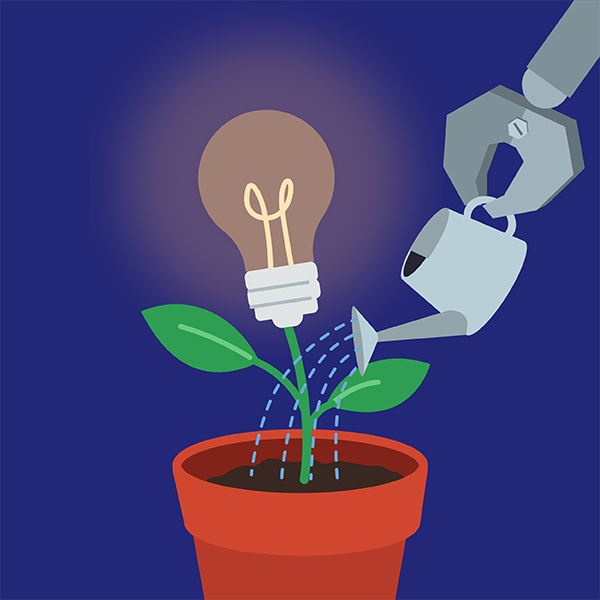To my higher ed friends: Here’s the punchline. You educated the creators of AI. You’re raising money for AI. Now you’ve got to walk the walk.
Armin Afsahi and I just left the CASE Summit Stage where we co-presented on the 10 Ways AI will Change Advancement. We’ll cover the salient and specific points of our presentation during a webinar on August 17 (register here).
And for now, while the buzz of CASE Summit is on my mind, I would like to address the topic of AI in advancement by sharing my thoughts on what’s already happening and what’s just around the corner for AI and advancement.
Table of Contents
Why advancement needs to pay attention to AI
The power of AI lies in scaling the intelligent use of data.
For context, your Starbucks app only has access to your preferred name and your email address. Think of the kind of AI-generated personalization that the Starbucks app delivers with this data set (“Would you like to re-order a mocha latte with oat milk?”). Or Amazon (“Based on your previous purchases, here are some items you might be interested in”). Or Spotify (“We curated a new playlist just for you”).
Now, think about the data points your alma mater has access to. They know where you went to high school. They know which student groups you were involved in while you were on campus. Which classes you excelled in. Which dorms you lived in. Which funds you’ve donated to, when, how often, how much, and why.
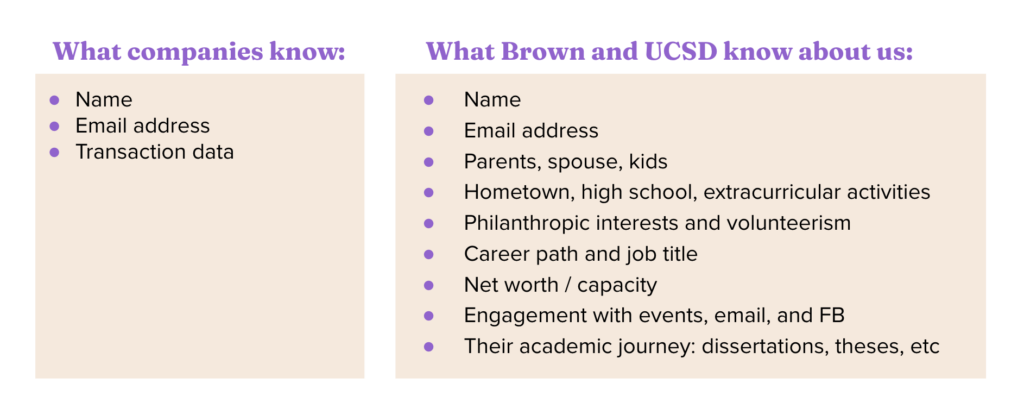
In terms of substantial data to power AI-generated personalization at scale, higher ed has a massive advantage to capture the mindshare, hearts, and attention of their donors, as compared to the for-profit world.
Alums like you are going through life and doing things that, in the for-profit world, would automatically trigger AI-powered personalized outreach. You change jobs. You donate to a scholarship in honor of your favorite professor. You like a video of commencement weekend on Facebook. You attend a local alumni happy hour. You attend a webinar. You buy tickets to a sports events. You make a million dollars (someday!). You plan your estate.
You do all these things… and rather than getting a personalized message of “thanks!” or “congrats!” from your alma mater, you get… crickets.
Despite recent advancements in AI, despite the huge data advantage that universities have over the for-profit industry, mostly the advancement industry has not changed the way we connect with alums.
And we have to.
Why?
First of all, we can't afford not to.
Colleges and Universities continue to raise over $50BB a year. But while total giving to higher education increased by 12.5 percent in FY22, a handful of large gifts have masked an overall drop in small- and mid-sized gifts (source: Nonprofit quarterly). And the donor pool, which was already in decline, hit a freefall at the start of the Covid-19 pandemic. According to EverTrue research, donor count in higher education has dropped 8.7 percent from FY19.
In the past year…
- 1.06% of constituents are assigned… less than 2% at pretty much every institution
- 8 of 10 assigned prospects did not have a meeting
- 70% of assigned prospects had fewer than 3 touch points
- 35% of assigned prospects had ZERO interactions
- 95.6% of constituents with $1MM or more in household net worth were unassigned.
We simply have to reach more donors. (You can read our recent white paper on gift officer efficiency.)
Colleges and Universities do a show-stopping incredible job at acknowledging and stewarding the top-top donors. But when it comes to reaching deeper into our alumni bases to bring this sense of community and connection to more donors, we have not even scratched the surface.
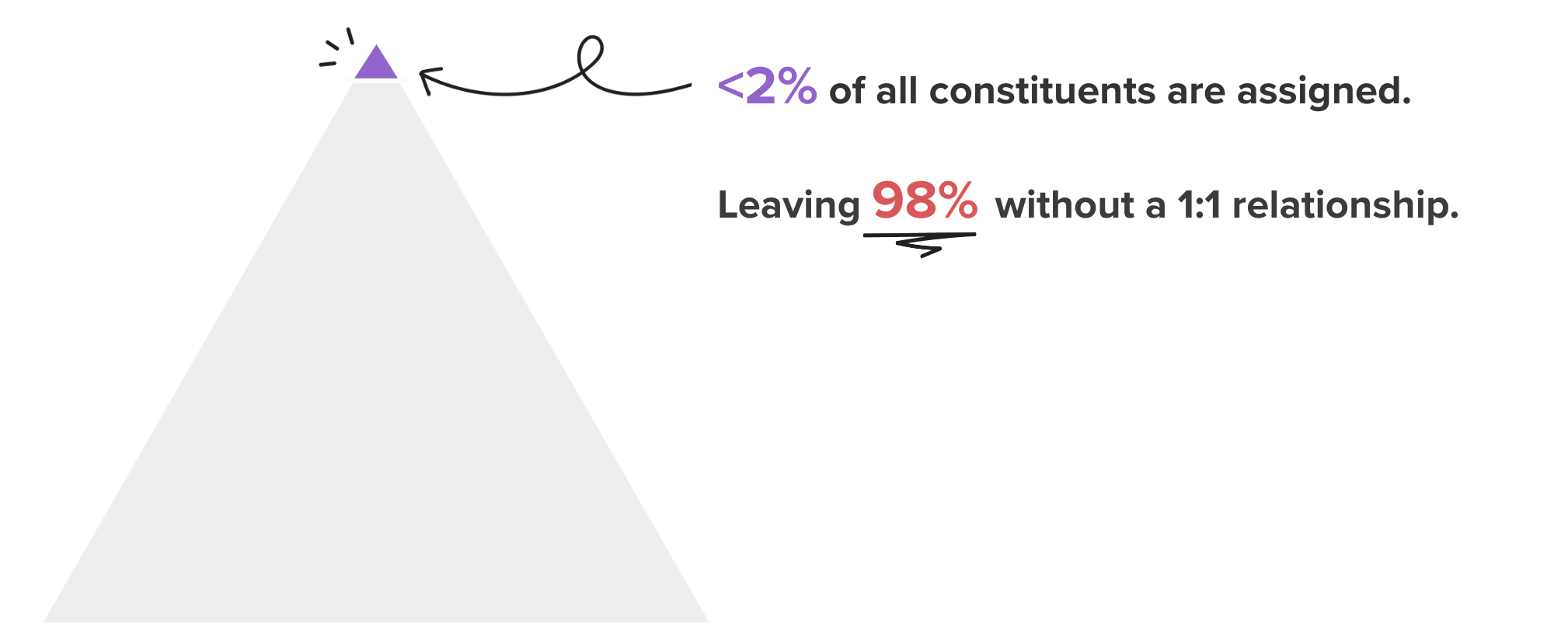
Second of all, you created AI.
And let me state clearly and up-front that I’m glad you did because it will collectively increase access to education and solve the world’s biggest problems like generational poverty and human trafficking and cancer and so many other huge issues that colleges and universities are uniquely equipped to solve.
But, seriously – the institution you work for likely educated some of the geniuses that have founded, developed, and grown Artificial Intelligence. Your graduates work at Google, Apple, Microsoft, Alphabet – and their degrees got them there. Your faculty members mentored them, your classrooms raised them, your campuses inspired them.
Every college or university declares it somewhere in their mission statement: to educate the next generation of leaders who will change the world.
Well, your alums created the underlying technology that is allowing us to experience AI in our day-to-day. Mission, accomplished!
PLUS a ton of research about AI was and is currently being done on your campus. You employ the AI experts, too.
And because you’ve grown all these experts, millions of people across almost every imaginable industry are simultaneously and actively putting AI capabilities to the test and openly sharing the outcomes. ChatGPT grew to over 100 million users and 1.8 billion website visitors within three months of its launch.
That’s explosive growth that we simply can’t ignore.
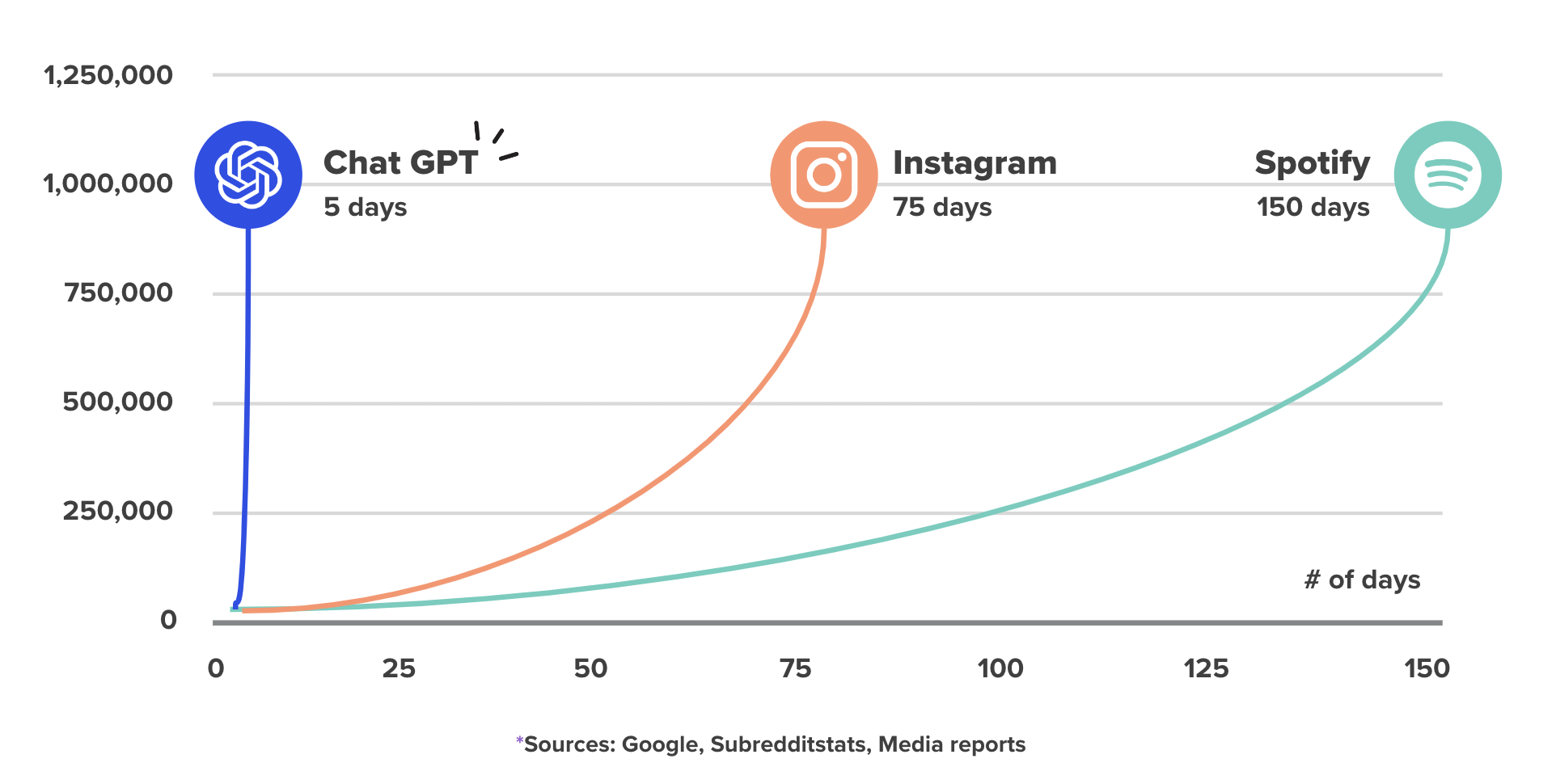
AI in Advancement: What's Already Happening
If you are reading this, you know, you just know, the aspects of your job that could be automated, and everyone would win. You could probably make a list of 10 things off the top of your head that, if automated, would free up hours of time each week for you to focus on things that really move the mark.
Cameron Hall, Executive Director of Annual Giving at the University of South Carolina, used ChatGPT to write most of their recent giving day messaging. They closed the day with the highest number of donors, and first-time donors, in six years. His team also sent 392 dean’s letters from 20+ units, written in the voice/tone of the dean, customized to past donor behavior, in half a day. (Here’s Cameron’s story.)
Here’s another example of AI currently at play in the advancement arena. Michael Reza, AVP at the University of Oregon, is leading the fundraising strategy to support the Ballmer Institute for Children’s Behavioral Health at the University of Oregon, which offers the nation’s first bachelor’s degree in Children’s Behavioral Health. He and his team spent months building out a stellar case statement.
Then, to test it out, Michael plugged the fundamentals of the mission, vision, values, and fundraising priorities of the Ballmer Institute into ChatGPT, to see what kind of case statement it produced.
In Michael’s words, “It didn’t sound like us, but I like some of the nuance that it created by reframing what we wrote in a different way. It rearranged some things, and it flowed a little bit better.” (Here’s Michael’s story.)
These are just a few examples of AI currently at play in the advancement realm.
Here’s another one, an update to the EverTrue product that is just around the corner. In the EverTrue iOS app, users will be able to view constituent summaries that include highlights of contact reports, notable giving events, digital engagement, and career data to give fundraisers a high-level overview of every prospect in seconds. Perfect for a last-minute refresher right before a donor meeting.
We recently demo-ed this functionality to two of our tech-forward advancement friends. Here’s what they had to say about AI-generated prospect summaries in the EverTrue platform.
"This is exactly what I was hoping for from AI. It's opening up bandwidth for the rest of the team by consolidating information, synthesizing it, and putting it in a place where it's easy for everyone to access. Now every gift officer or development associate has helpful, up-to-date prospect bios in their hands."
AVP of Prospect Development
"I can pull up that summary right before I go into a visit to keep the most pertinent information top-of-mind. And being able to do it in 30 seconds or less makes me more efficient and effective as a fundraiser."
Director of Leadership Giving
At EverTrue, we have long been proponents of automating the process to focus on the experience. This is a relationship business. AI-powered automations are already in the works and gaining ground at the country’s forward-thinking shops, and they’re freeing up fundraisers to focus on cultivating relationships with thousands of alumni who have been overlooked for too long.
Read on for more details re: the untapped potential of your alumni base and how AI will help.
AI in Advancement: What Will Happen Next
I recently asked Michael Reza to “wave a magic wand and sprinkle ChatGPT all over the advancement sector. What would it look like a year or two from now?”
Here’s what he identified as tasks that could be automated by AI:
- Suggested language for cold outreach/intro emails
- Suggested language for thank you emails
- Suggested language for acknowledgement letters from university leadership
- Synthesizing donor interests (social interactions, contact report keywords such as professor names, job titles, other philanthropic giving)
- Suggesting solicitation angles based on these data points
This seemed to both Michael and I to be a pretty great “Advancement AI Wishlist.” And, a pretty great EverTrue product roadmap.
Over the past three years, we have been synthesizing our cross-platform data to identify the next-best three- to five-thousand prospects for our Donor Experience partner institutions. We now know the giving patterns, Facebook engagement, wealth events, and career changes that indicate the high-potential but long-overlooked prospects who are overdue for 1:1 outreach from their alma mater.
So, we have the data. We know the sets of circumstances that indicate capacity, inclination, and ready-to-talk. When we marry this data with the power of AI, there is so much possibility.
Here's what's coming soon in the EverTrue platform.
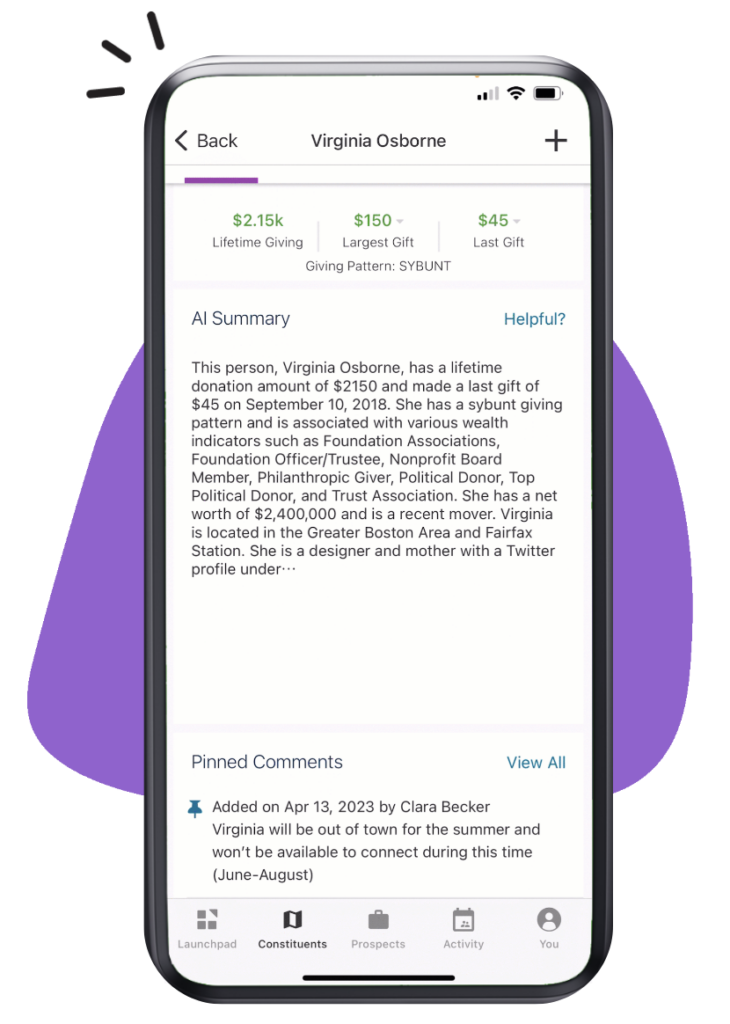
AI-powered constituent profile summaries. Using the EverTrue iOS app, users can opt-in to view constituent summaries that include highlights of contact reports, notable giving events, digital engagement, and career data to give fundraisers a high-level overview of every prospect in seconds. (Perfect for a last-minute refresher right before a donor meeting.)
Donor Potential Score (DPS). Using EverTrue data, our platform will employ a machine-learning algorithm to identify and score prospects, providing an easy-to-use tool to identify your best donors.
1:1 ThankView messaging. Gift officers will receive prompts to send a personalized ThankView message when a donor in their portfolio changes jobs or makes a gift.
Daily task lists. In EverTrue, fundraisers will opt to view daily “to-do” lists to make sure no prospects fall through the cracks and to provide a framework for consistent, cadenced outreach.
As we move forward with prescriptive frameworks for fundraisers to connect with the right donors at the right time, the focus will be on deep synthesis and summarization of data; identification of long-overlooked prospects; prescriptive, cadenced outreach; and clear visibility into activity and ROI.
These advancements in our platform are possible because of a number of mergers and acquisitions that have taken place at EverTrue over the last two years. It’s only with the right mix of tech tools and data that we can fully empower advancement teams.
Join us.
We are inviting industry thought leaders to join an EverTrue Advisory Group. Group members will bring the industry expertise to assist with product beta testing and inform new product developments, keeping us on the cutting edge while also tethered to the daily realities of what fundraisers actually need.
If you are interested in joining, please email Vicki Bouwkamp, Product Marketing Manager, with subject line: EverTrue Advisory Group.
We look forward to building the future of advancement with you.
